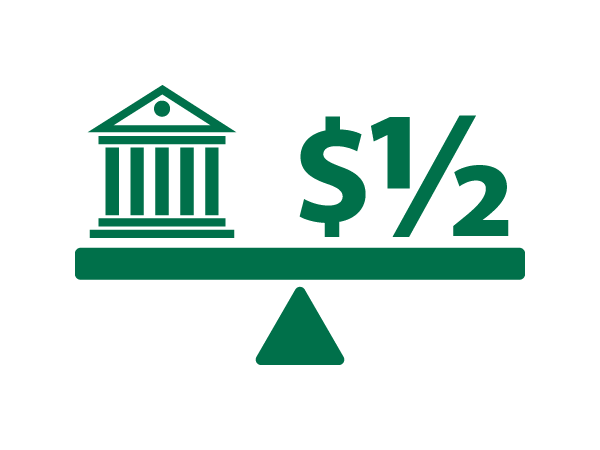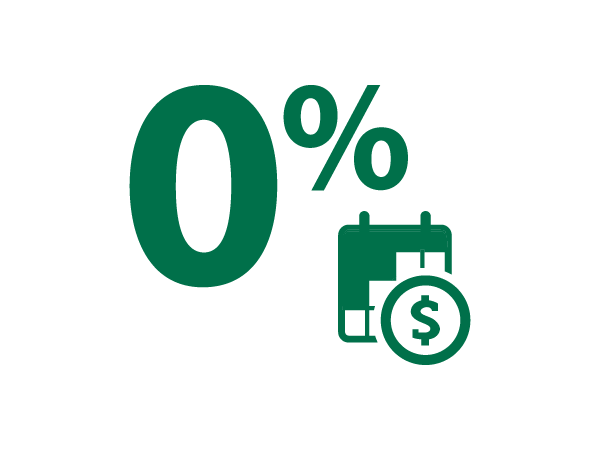We know that cost plays a big role in whether you decide to go to a college or not. We think this will help you make your decision!
Keep in mind, the costs listed here do not include your meals, housing, transportation or other personal expenses you may have while attending college. Also, these rates are subject to change by the Delta College Board of Trustees.
Tuition and fees are based on contact hour, not credit hour.
2025-2026 TUITION & FEES
Tuition
| Residency status | Cost |
|---|---|
| In-district | $136 per contact hour |
| Out-district | $229 per contact hour |
| Out-of-state | $240 per contact hour |
| Dual Enrollment | $136 per contact hour |
If you are a resident of the Delta College district, 60 years of age or older, you may register for courses at 50% of the current tuition rate (excludes fees). Contact the Registrar's office at 989-686-9305 or registration@delta.edu for more information.
Fees
| Type of fee | Cost |
|---|---|
| Registration fee (Non-refundable) | $40 / semester |
| Technology fee | $25 / contact hour |
Estimated costs for 12 contact hours per semester
| Fee | In-District | Out-District | Out-State-Foreign |
|---|---|---|---|
| Tuition | $1,632 | $2,748 | $2,880 |
| Registration fee | $40 | $40 | $40 |
| Course fees (estimated) | $300 | $300 | $300 |
| Total | $1,972 | $3,088 | $3,220 |
2024-2025 tuition & fees
Tuition
| Residency status | Cost |
|---|---|
| In-district | $133 per contact hour |
| Out-district | $224 per contact hour |
| Out-of-state | $235 per contact hour |
| Dual Enrollment | $133 per contact hour |
If you are a resident of the Delta College district, 60 years of age or older, you may register for courses at 50% of the current tuition rate (excludes fees). Contact the Registrar's office at 989-686-9305 or registration@delta.edu for more information.
Fees
| Type of fee | Cost |
|---|---|
| Registration fee (Non-refundable) | $40 / semester |
| Technology fee | $25 / contact hour |
Estimated costs for 12 contact hours per semester
| Fee | In-District | Out-District | Out-State-Foreign |
|---|---|---|---|
| Tuition | $1,596 | $2,688 | $2,820 |
| Registration fee | $40 | $40 | $40 |
| Course fees (estimated) | $300 | $300 | $300 |
| Total | $1,936 | $3,028 | $3,160 |
cost definitions
Contact Hour Fee
Students will be charged tuition based on the total number of contact hours for each class, which is the amount of instruction time. Because instruction times vary, classes may have different tuition costs such as those with tutorials, laboratory hours or additional in-class time.
The tuition costs may vary from the number of credits earned in the class because credits are determined by national standards and allow for transferability to other colleges and universities.
Tuition
The money you pay the college for instruction and services. A dollar amount is assigned to each contact hour. Tuition is determined by multiplying the dollar amount by the number of contact hours for which you are registering. In-district, out-of-district, and out-of-state tuition rates are different.
Tuition, Technology Fees and the Online Course Fees are charged based on contact hour. All other course-specific fees are determined by the course.
Registration Fee
A non-refundable, per semester fee charge upon registration. No refund, unless all courses are cancelled by the College.
Technology Fee
This fee is based on class contact hours and supports increased use of technology in classrooms, labs, library and Teaching/Learning Center.
Additional course-specific fees, such as online, nursing or course content fees are charged to cover additional service relative to those courses.
ESTIMATED COST OF ATTENDANCE
2025/26
Below is a chart detailing the estimated Cost of Attendance for the 2025/26 year, based on full-time attendance for Fall, Winter and Spring semesters, totaling 45 contact hours.
| Expenses | In-District | Out-District | Out-State |
|---|---|---|---|
| Tuition | $6,120 | $10,305 | $10,800 |
| Technology Fee | $1,125 | $1,125 | $1,125 |
| Registration Fee | $120 | $120 | $120 |
| Books and Supplies | $2,250 | $2,250 | $2,250 |
| Transportation | $3,804 | $3,804 | $3,804 |
| Miscellaneous | $3,504 | $3,504 | $3,504 |
| Living Expenses - Housing and Food* |
Living w/parent: $7,822 Living off campus: $11,700 |
Living w/parent: $7,822 Living off campus: $11,700 |
Living w/parent: $7,822 Living off campus: $11,700 |
| Living With Parent Totals | $24,745 | $28,930 | $29,425 |
| Living Off Campus Totals | $28,623 | $32,808 | $33,303 |
*Schools must include a housing component in the Cost of Attendance for dependent students who are living at home with their parent(s) and that allowance cannot be zero or the same figure as living off campus.
**For students receiving Federal Direct Loans, a loan fee will be added to their estimated Cost of Attendance ($72 for three semesters, $47 for two semesters and $24 for one semester).
2024/25
Below is a chart detailing the estimated Cost of Attendance for the 2024/25 year, based on full-time attendance for Fall, Winter and Spring semesters, totaling 45 contact hours.
| Expenses | In-District | Out-District | Out-State |
|---|---|---|---|
| Tuition | $5,985 | $10,080 | $10,575 |
| Technology Fee | $1,125 | $1,125 | $1,125 |
| Registration Fee | $120 | $120 | $120 |
| Books and Supplies | $2,475 | $2,475 | $2,475 |
| Transportation | $3,720 | $3,720 | $3,720 |
| Miscellanous | $3,420 | $3,420 | $3,420 |
| Living Expenses - Housing and Food* |
Living w/parent: $7,660 Living off campus: $11,424 |
Living w/parent: $7,660 Living off campus: $11,424 |
Living w/parent: $7,660 Living off campus: $11,424 |
| Living With Parent Totals | $24,505 |
$28,600 |
$29,095 |
| Living Off Campus Totals | $28,269 | $32,364 | $32,859 |
*Schools must include a housing component in the Cost of Attendance for dependent students who are living at home with their parent(s) and that allowance cannot be zero or the same figure as living off campus.
**For students receiving Federal Direct Loans, a loan fee will be added to their estimated Cost of Attendance ($69 for three semesters, $46 for two semesters and $23 for one semester).
Books & Supplies
The costs for books and supplies varies greatly depending on the class. So, we can't really estimate that. But, we guarantee it's as low as we can get away with, and still give you the best education possible. That's what we do here at Delta.
Visit the Delta Bookstore to see your required list of books and supplies.

Less than half the cost of a public university, with the same quality education.

An interest-free tuition plan that spreads out your payments.

Half of Delta students receive some form of assistance.

“Not only am I saving money on tuition, I’m saving money on housing. I’m saving even more money because I’m taking classes that I would take at a university for an incredibly lower price.”
Sam Rechsteiner
Pursuing an Associates in Science
Transferring to U of M to study Actuary Mathematics

